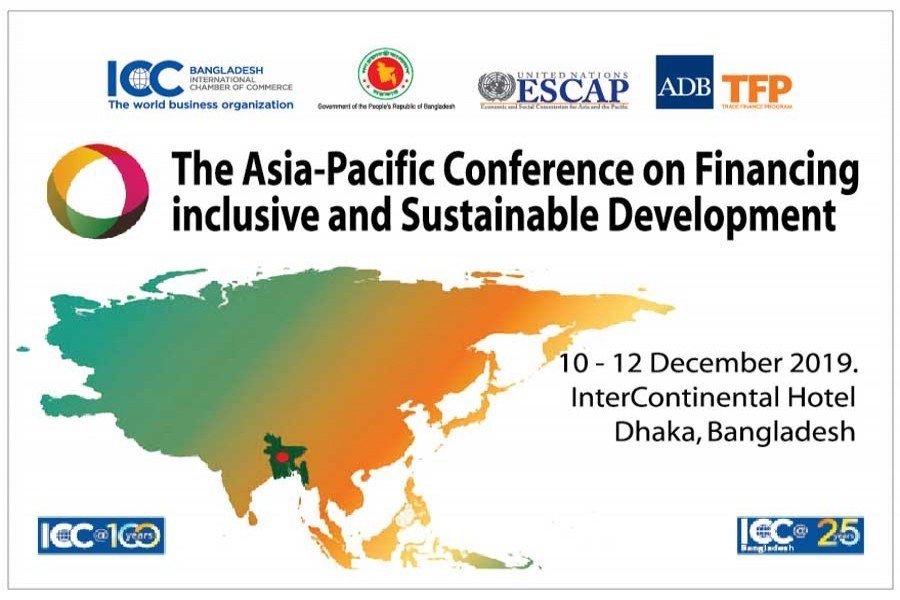Financial inclusion ensures access to finance for all sections of population, including vulnerable and low-income groups, providing suitable financial products that pave the way for alleviating poverty and lowering inequality in income distribution.
It also helps achieve sustainable growth, including the target of attaining the Sustainable Development Goals (SDGs).
Speakers said these in two plenary sessions of the ongoing Asia-Pacific Conference on Financing inclusive and Sustainable Development at a city hotel on Wednesday.
The International Chamber of Commerce, Bangladesh (ICCB) is organising the conference in collaboration with the government of Bangladesh, UNESCAP and ADB-TFP.
The programme is being organised to support the region with policies and innovations to meet the challenges of achieving SDGs.
Planning Minister Muhammad Abdul Mannan chaired one session, and former caretaker government adviser Syed Manzur Elahi chaired the other.
Former caretaker government adviser Dr A B Mirza Azizul Islam, Undersecretary of the United Nations and Executive Secretary of ESCAP Dr Armida Salsiah Alisjahbana, Vice Minister for Cambodian Ministry of Commerce Bun Chanthy, Vice Chairman of National Planning Commission, Nepal Professor Dr Puspa Raj Kadel, the Asian Development Bank (ADB) Country Director Manmohan Parkash, former chairman of the Bangladesh Tariff Commission Professor Mohammad Ali Taslim, Under Secretary of State (Vice Minister) Ministry of Industry and Handcraft of Cambodia Laim Kimleng, Senior Economic Advisor to Sri Lankan Prime Minister Ajith Nivard Cabraal, Executive Director of Institute of Inclusive Finance Development Dr Mustafa K Mujeri, and Chief of Staff ICC Paris Quinlan Carthane also spoke on the occasion, among others.
The planning minister said the government has taken the target to achieve SDGs seriously. But regional and multi-level cooperation is needed to achieve sustainable development in the Asia-Pacific region.
He also said the region needs higher trade and regional integration to achieve sustainable development.
Dr A B M Mirza Azizul Islam underlined the need for taking policy actions to ensure financial inclusion with high quality financial products.
Inequality in health, men and women, and income distribution will be a threat in achieving the target of 'no one leaving behind', he noted.
He also highlighted the challenges in inclusive financing from both demand and supply sides.
The ADB country director said inclusive and sustainable financing is needed to help build a more liveable and happier planet for the future generations.
But people in different walks of life, in public institutions, in political and business leaderships, or individuals in their daily routines have to make right choices for inclusive financing to achieve SDGs, he noted. Policy choices beyond electoral horizons, and private choices beyond sums on the balance sheet are necessary, he also mentioned.
Syed Manzur Elahi termed financial inclusion a global agenda, and said it is still challenging in the Asia-Pacific region.
 He also said many countries in the region have taken it as an important strategy to achieve SDGs. Many Asian countries have set specific targets to promote financial inclusion, and implemented various initiatives in this regard.
He also said many countries in the region have taken it as an important strategy to achieve SDGs. Many Asian countries have set specific targets to promote financial inclusion, and implemented various initiatives in this regard.
He further said financial infrastructure is still a problem in the Asia-Pacific region, and underscored the need for ensuring efficiency in financial system, as it is critical to realise financial inclusion.
For successful inclusion more advertisement, quality of regulatory policies, enabling environment in the form of macro-economic stability, and greater financial inclusion with financial literacy and its absorbance are necessary, he added.
The ESCAP executive secretary underlined the need for easing financial constraints and reaching people, including women, through ensuring access to finance and digital financial system.
The Cambodian vice minister for ministry of commerce highlighted the country's growth target, and said Cambodia is working to be a high middle income country by 2030 and high income country by 2050.
Dr Puspa Raj Kadel said Nepal is working based on the spirit of 'no one leaving behind' during the last four years. But global warming has made the country vulnerable to climate changes and prone to disasters.
Professor Taslim highlighted the threats connected with technology, and said nexus between growth and poverty must be properly addressed.
He also opined that private sector engagement, appropriate infrastructure, bankable products, political stability, and policies to tackle climate change-related disasters are needed to be focused.
Besides, mobilisaton of domestic resources, infrastructure financing, human resource development, women empowerment, and access to finance etc are keys to inclusive financing for sustainable development in the region, he opined.
Dr Mujeri termed financial inclusion as the backbone to achieve SDGs, and said sharing experiences of the countries can play a vital role in creating a global climate for financing.


